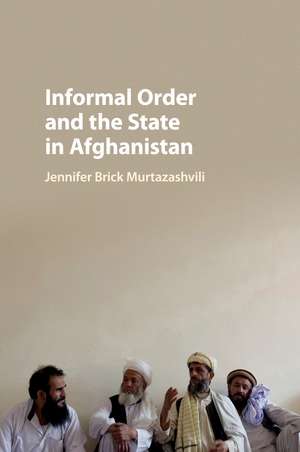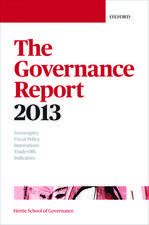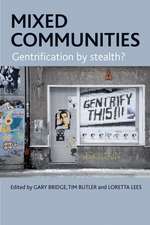Informal Order and the State in Afghanistan
Autor Jennifer Brick Murtazashvilien Limba Engleză Paperback – aug 2018
| Toate formatele și edițiile | Preț | Express |
|---|---|---|
| Paperback (1) | 322.51 lei 6-8 săpt. | |
| Cambridge University Press – aug 2018 | 322.51 lei 6-8 săpt. | |
| Hardback (1) | 839.24 lei 6-8 săpt. | |
| Cambridge University Press – 20 apr 2016 | 839.24 lei 6-8 săpt. |
Preț: 322.51 lei
Nou
Puncte Express: 484
Preț estimativ în valută:
61.71€ • 64.44$ • 50.96£
61.71€ • 64.44$ • 50.96£
Carte tipărită la comandă
Livrare economică 15-29 aprilie
Preluare comenzi: 021 569.72.76
Specificații
ISBN-13: 9781107534582
ISBN-10: 1107534585
Pagini: 363
Ilustrații: 2 maps 17 tables
Dimensiuni: 153 x 230 x 23 mm
Greutate: 0.53 kg
Editura: Cambridge University Press
Colecția Cambridge University Press
Locul publicării:New York, United States
ISBN-10: 1107534585
Pagini: 363
Ilustrații: 2 maps 17 tables
Dimensiuni: 153 x 230 x 23 mm
Greutate: 0.53 kg
Editura: Cambridge University Press
Colecția Cambridge University Press
Locul publicării:New York, United States
Cuprins
1. Introduction; Part I. The Politics of Customary Governance: 2. The Afghan state in historical perspective; 3. The architecture of village governance; Part II. Customary Governance and Public Goods Provision: 4. The political economy of village governance; 5. Cooperation among communities; Part III. Customary Governance and the State: 6. Customary organizations and support for the state; 7. Federalism, Afghan style; 8. Conclusion.
Recenzii
'We often assume that customary order and the modern state are fundamentally at odds. Rolling up her sleeves to conduct in-depth fieldwork in rural Afghanistan, Jennifer Brick Murtazashvili questions this assumption by examining how the state and governance are in fact experienced at the local level. The result is a triumph of well-grounded empirical work, theoretical insight, and clear argumentation. Our understanding of how public goods are provided in weak-state contexts will never be the same.' Edward Schatz, University of Toronto
'Jennifer Brick Murtazashvili's extensive field research conducted in over thirty villages in ethnically diverse Afghan provinces lends great authority to her narrative on Afghanistan's decentralized governance. Indeed, Informal Order and the State in Afghanistan, is the only book in print that explains how (her apt term) 'informal federalism' operates at the local level. It offers a rare, fresh, and accurate perspective for any way ahead in Afghanistan today. It should be essential reading for all those inside and outside of government interested in Afghan affairs.' Peter Tomsen, Former US Special Envoy to Afghanistan
'This excellent book questions the conventional wisdom that informal village governance is at odds with effective public goods provision. The author's impressive study of Afghanistan, using hundreds of interviews and national surveys show that customary organizations not only fulfill many state functions but they also increase support for the state and democracy. In skillfully combining general theory and contextual depth, Murtazashvili advances our understanding of informal governance, decentralization, and the missed opportunities for state-building in post-Taliban Afghanistan.' Scott Radnitz, University of Washington
'Jennifer Brick Murtazashvili's extensive field research conducted in over thirty villages in ethnically diverse Afghan provinces lends great authority to her narrative on Afghanistan's decentralized governance. Indeed, Informal Order and the State in Afghanistan, is the only book in print that explains how (her apt term) 'informal federalism' operates at the local level. It offers a rare, fresh, and accurate perspective for any way ahead in Afghanistan today. It should be essential reading for all those inside and outside of government interested in Afghan affairs.' Peter Tomsen, Former US Special Envoy to Afghanistan
'This excellent book questions the conventional wisdom that informal village governance is at odds with effective public goods provision. The author's impressive study of Afghanistan, using hundreds of interviews and national surveys show that customary organizations not only fulfill many state functions but they also increase support for the state and democracy. In skillfully combining general theory and contextual depth, Murtazashvili advances our understanding of informal governance, decentralization, and the missed opportunities for state-building in post-Taliban Afghanistan.' Scott Radnitz, University of Washington
Notă biografică
Descriere
Despite efforts to build the state, profound political order in rural Afghanistan is maintained by self-governing, customary organizations.














